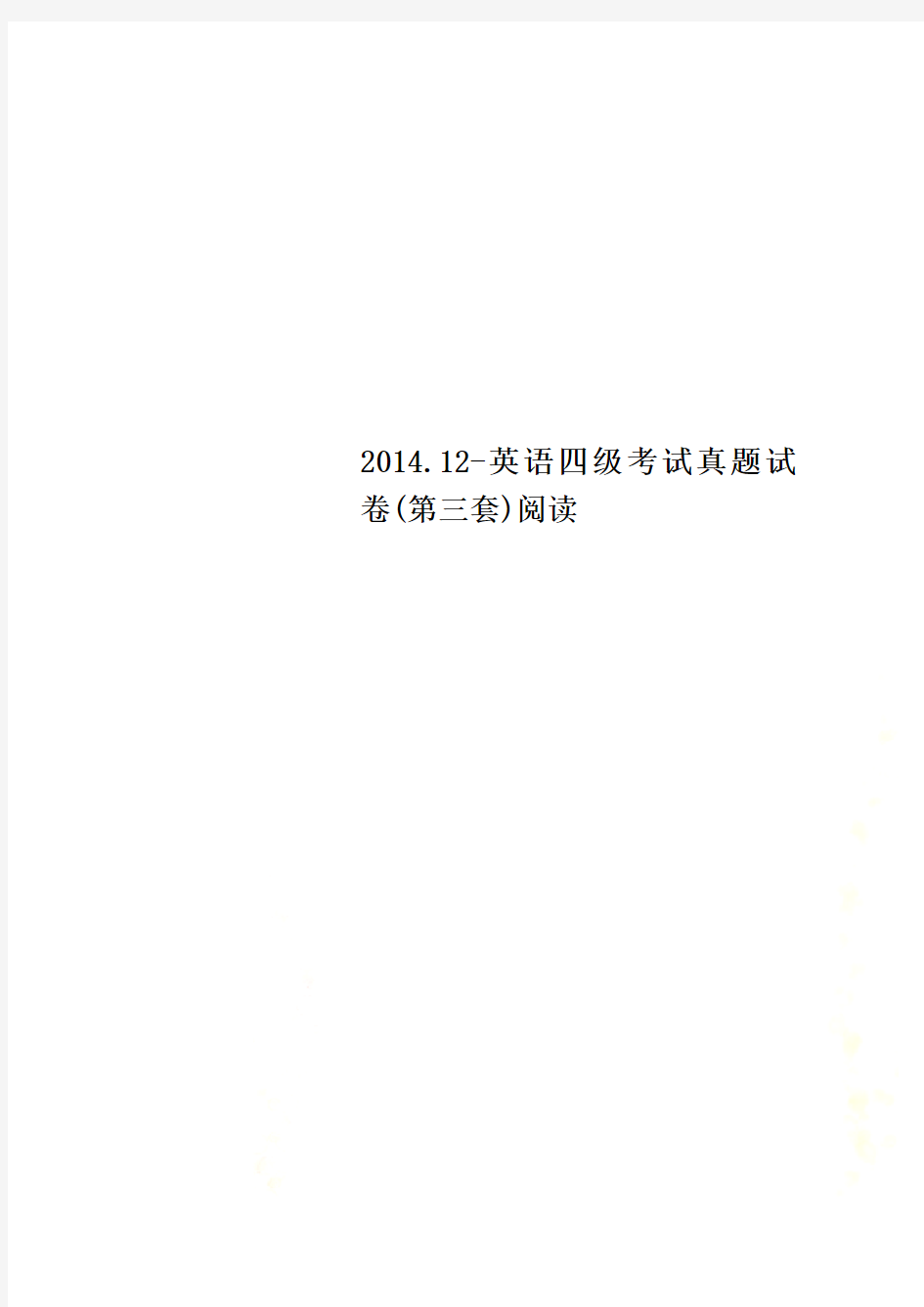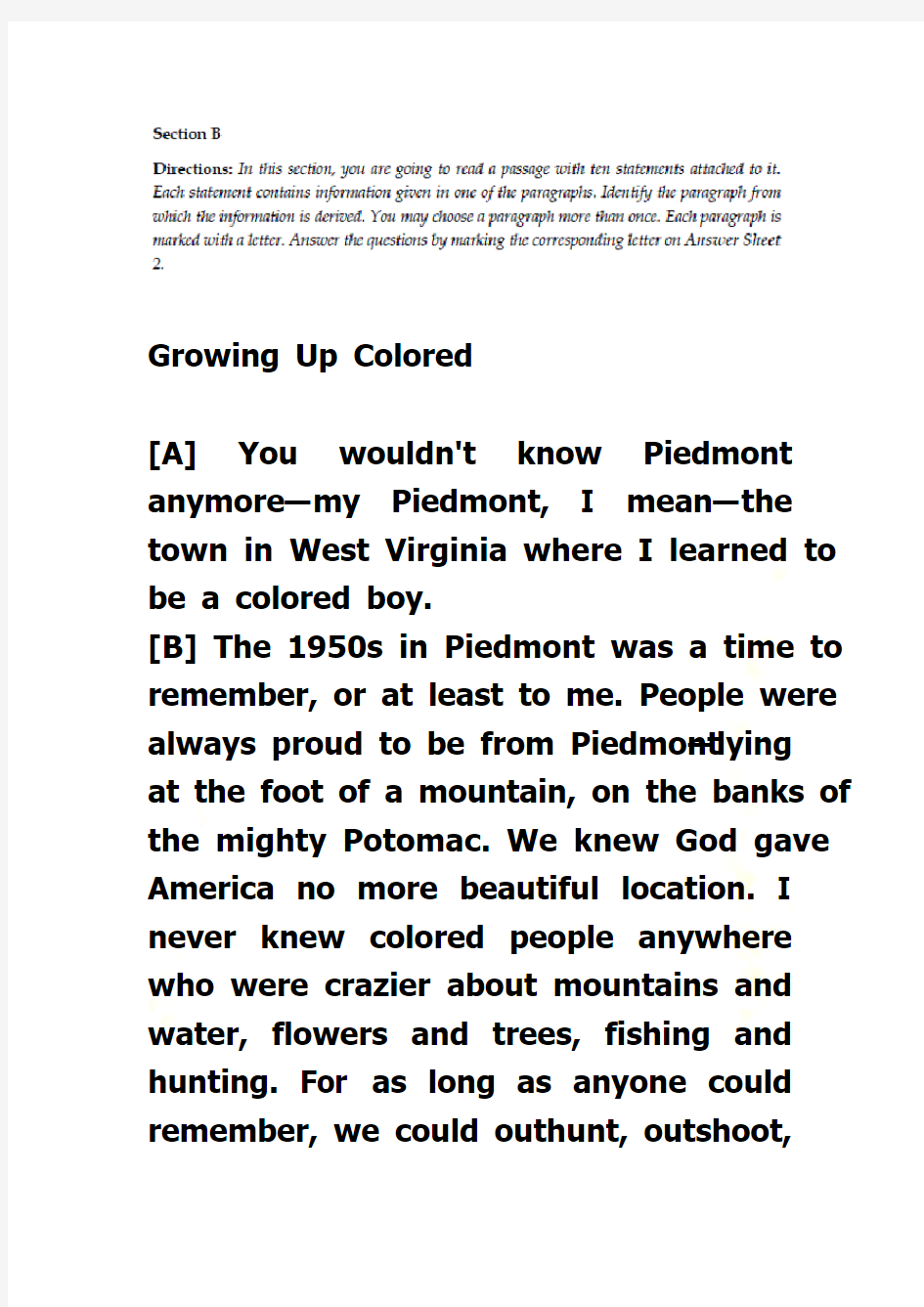2014.12-英语四级考试真题试卷(第三套)阅读


2014.12-英语四级考试真题试卷(第三套)阅读
Growing Up Colored
[A] You wouldn't know Piedmont anymore—my Piedmont, I mean—the town in West Virginia where I learned to be a colored boy.
[B] The 1950s in Piedmont was a time to remember, or at least to me. People were always proud to be from Piedmont—lying at the foot of a mountain, on the banks of the mighty Potomac. We knew God gave America no more beautiful location. I never knew colored people anywhere who were crazier about mountains and water, flowers and trees, fishing and hunting. For as long as anyone could remember, we could outhunt, outshoot,
and outswim the white boys in the valley.
[C] The social structure of Piedmont was something we knew like the back of our hands. It was an immigrant town; white Piedmont was Italian and Irish, with a handful of wealthy WASPs (盎格鲁撒克逊裔的白人新教徒) on East Hampshire Street, and "ethnic" neighborhoods of working-class people everywhere else, colored and white.
[D] For as long as anyone can remember, Piedmont's character has been completely bound up with the Westvaco paper mill: its prosperous past and doubtful future. At first glance, the town is a typical dying mill center. Many once beautiful buildings stand empty, evidencing a bygone time of spirit and pride. The big houses on East Hampshire Street are no longer proud, as they were when I
[E] Like the Italians and the Irish, most
existence. And though our own world was seemingly self-contained, it impacted on the white world of Piedmont in almost every direction. Certainly, the borders of our world seemed to be impacted on when some white man or woman showed up where he or she did not belong, such as at the black Legion Hall. Our space was violated when one of them showed up at a dance or a party. The rhythms would be off. The music would sound not quite right: attempts to pat the beat off just so. Everybody would leave early.
[H] Before 1955, most white people were just shadowy presences in our world, vague figures of power like remote bosses at the mill or tellers at the bank. There were exceptions, of course, the white people who would come into our world in ritualized, everyday ways we all understood. Mr. Mail Man, Mr. Insurance
Man, Mr. White-and-Chocolate Milk Man, Mr. Landlord Man, Mr. Police Man: we called white people by their trade, like characters in a mystery play. Mr. Insurance Man would come by every other week to collect premiums on college or death policies, sometimes 50 cents or less.
[I] "It's no disgrace to be colored," the black entertainer Bert Williams famously observed early in the century, "but it is awfully inconvenient." For most of my childhood, we couldn't cat in restaurants or sleep in hotels, we couldn't use certain bathrooms or try on clothes in stores. Mama insisted that we dress up when we went to shop. She was carefully dressed when she went to clothing stores, and wore white pads called shields under her arms so her dress or blouse would show no sweat. "We'd like to try this on," she'd say carefully, uttering her words
precisely and properly. "We don't buy clothes we can't try on," she'd say when they declined, and we'd walk out in Mama's dignified (有尊严的) manner. She preferred to shop where we had an account and where everyone knew who she was.
[J] At the Cut-Rate Drug Store, no one colored was allowed to sit down at the counter or tables, with one exception: my father. I don't know for certain why Carl Dadisman, the owner, wouldn't stop Daddy from sitting down. But I believe it was in part because Daddy was so light-colored, and in part because, during his shift at the phone company, he picked up orders for food and coffee for the operators. Colored people were supposed to stand at the counter, get their food to go, and leave. Even when Young Doc Bess would set up the basketball team with free Cokes after one of many victories,
